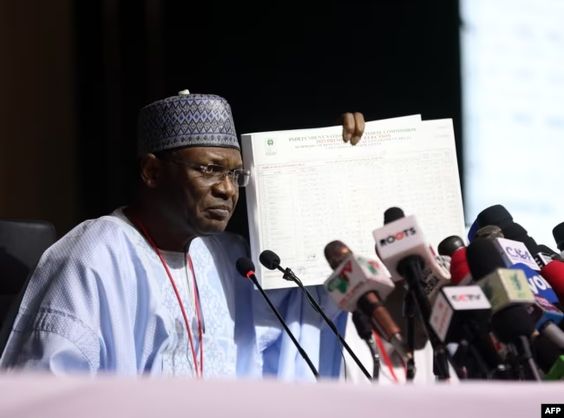Nigeria
INEC Starts an Election Review Despite Court Challenges

This week marked the start of the Nigerian Electoral Commission’s month-long examination of the presidential and local elections that took place in February and March of 2023. The election, which was marred by violence and technological hiccups, was regarded as one of the most divisive in recent memory.
The Independent National Electoral Commission’s (INEC) Mahmood Yakubu met with state election officials in the nation’s capital on Tuesday. Yakubu praised INEC for successfully implementing the voter accreditation system and added that INEC would assess its operations and the efficiency of the technology deployed.
Yakubu declared that the process would be impartial and that INEC will make its findings available to the public.
Yakubu told reporters that it was time for reflection, inventory-taking, assessment, and evaluation. Political parties, candidates, and observers have all expressed a variety of viewpoints after the elections were over, and the commission welcomed all of them as long as their goal was to strengthen our democracy and improve the way elections were conducted.
According to officials, INEC has received 54 reports about the election’s administration from several observer teams.
The assessment is starting a week after the final report on the elections from the European Union observation mission was issued, sparking some discussion.
Elections, according to the EU, did not guarantee the inclusive, transparent, and well-run democratic process that the INEC had pledged. Additionally, it said that during the presidential election, popular confidence and faith in the INEC were badly undermined and were not recovered after state-level elections.
The report also mentioned security concerns, pointing out that the political climate had been particularly hostile before the election.
This week, the Nigerian presidency rejected the EU findings.
Idayat Hassan, the head of the Center for Democracy and Development, asserted that the research was accurate in pointing out that the political climate was already difficult even before the elections.
Nobody is disputing that INEC overpromised and underdelivered, but Hassan said that INEC should take into account the current circumstances surrounding this election. For instance, the fact that this election took place in an environment of fuel and naira scarcity lowered morale and prevented Nigerians from traveling to other regions of the nation to vote or even participate.
According to Hassan, INEC must conduct the assessment in a wider perspective, taking into account prior elections as well as its partnerships with security agencies and other stakeholders.
At least 21 people were killed in violence that disrupted the presidential and subnational elections held on February 25 and March 1.
Observers claim that voting was repressed in some states, and there were logistical and operational problems as well.
One of the election observers, Emmanuel Njoku of the NGO Connected Development, claimed that the INEC lacked the experience necessary to run elections and criticized their hiring procedure.
“You can grade yourself in an exam, but you cannot review yourself. If the European Union issued a report, that is what they found, and at Connected Development, we concur with a few of their findings. We collaborated closely with them. In addition to the operational failure and logistical problem at the headquarters, they [INEC] failed miserably, according to Njoku.
Since 2011, INEC has been reviewing its performance in elections.
Along with cases involving high-ranking officials, the committee is also looking through evidence of violations in more than 200 investigations that were closed by the police.
An appeals court in Abuja closed the defense hearing for the lawsuits filed by the opposition organizations contesting Bola Tinubu’s election on Wednesday. Later this month, the court will meet once more.
